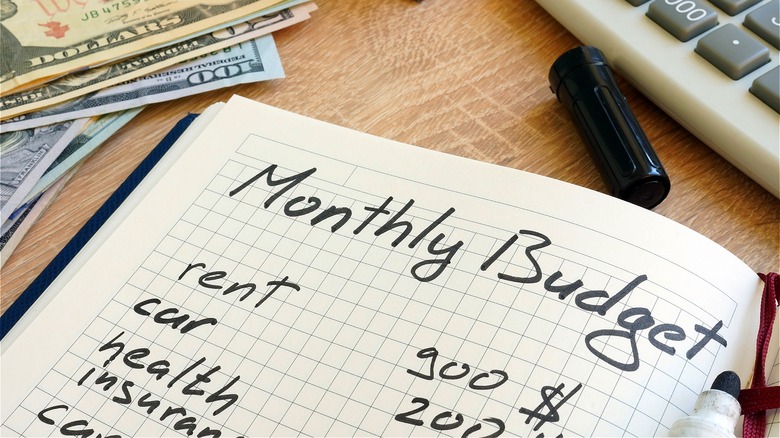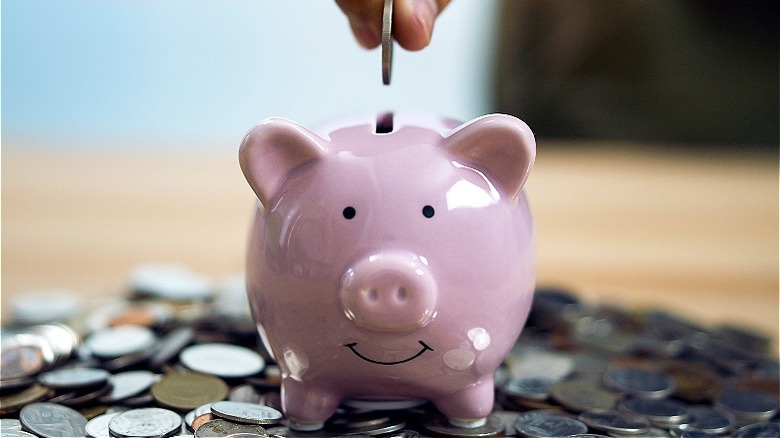The Best Way To Save Money If You're Living Paycheck To Paycheck
According to a 2023 Payroll.org survey of more than 38,000 workers, 78% of Americans reported living paycheck to paycheck, with 49% of respondents answering it would be "very difficult" to meet their current financial obligations if their paycheck was delayed by a week. When someone is in the throes of living paycheck to paycheck, things can seem bleak. What if an emergency pops up, but there's practically nothing in savings? This could very well completely derail their ability to cover expenses for the following month.
Despite the stress of the situation, financial experts agree that in most cases of living paycheck to paycheck, there are still ways to avoid having a depleted bank account, while actually saving some money in case of an unexpected emergency. The person just has to be willing to take a hard look at their spending habits, construct a strict and detailed budget, and set aside some cash — no matter how small the amount — each payday for a rainy day fund.
Focus on the essentials, ditch the luxuries
Even when an individual or family is living paycheck to paycheck, it's easy to treat oneself to the occasional splurge. It was a difficult month, so why not opt for McDonald's for dinner Friday night and subscribe to Netflix to watch Ryan Gosling's 2022 action-thriller "The Gray Man" (the movie that gave the actor his biggest payday)?
However, if these mini splurges happen too frequently, they can add up quickly. According to a US Foods survey, Americans spend an average of $166 per month dining out. As for streaming services, Deloitte reports the average monthly cost per U.S. consumer is $61. Still, many aren't aware of just how much they're spending on such luxuries, causing them to feel avoidable stress at the end of the month. "The chaos is eating these dollars for breakfast. And so a written budget, a detailed budget, will make you feel like you've gotten a raise," explained personal finance expert Dave Ramsey. "You have to tell it [money] what to do before it leaves, on paper, on purpose, before the month begins, every single month."
Before allowing any funds to be spent on splurges, a person living paycheck to paycheck should make sure the essentials — food, utilities, shelter, and transportation, known as the Four Walls — are prioritized before spending even a dollar on something that's a "want," rather than a "need."
Slowly build an emergency fund
Once a strict budget is created and the frequent luxury splurge (which can be avoided by practicing the 24-hour money-saving hack) is halted, many people living paycheck to paycheck will find they have more money left over at the end of the month than they're used to. Rather than spend this extra cash on a nonessential, financial experts recommend putting it into a savings account. According to Fidelity Investments, even setting aside 5% per paycheck could be beneficial in the long run.
For example, if someone brings home $1,000 each pay, and ensures that 5% (or $50) goes into a rainy day fund, they'll have accumulated a few hundred dollars in a few months and $600 in a year. Then, if an unanticipated emergency pops up, whether it be a pricey car repair, house maintenance, or medical bill, they can dip into those saved-up funds without completely derailing next month's budget. As for how much to save, experts like Dave Ramsey recommend saving enough to cover three to six months' worth of expenses. Also, the money you save should be in a liquid savings account, which will allow for quick and easy withdrawals.
Ultimately, this emergency fund serves as a safety net. Though a person may need to ditch Netflix and their favorite Starbucks (is this chain or Dunkin' cheaper?) latte to make such a thing possible, they're avoiding putting themselves in a financial crisis if, and when, the unexpected expense pops up.


